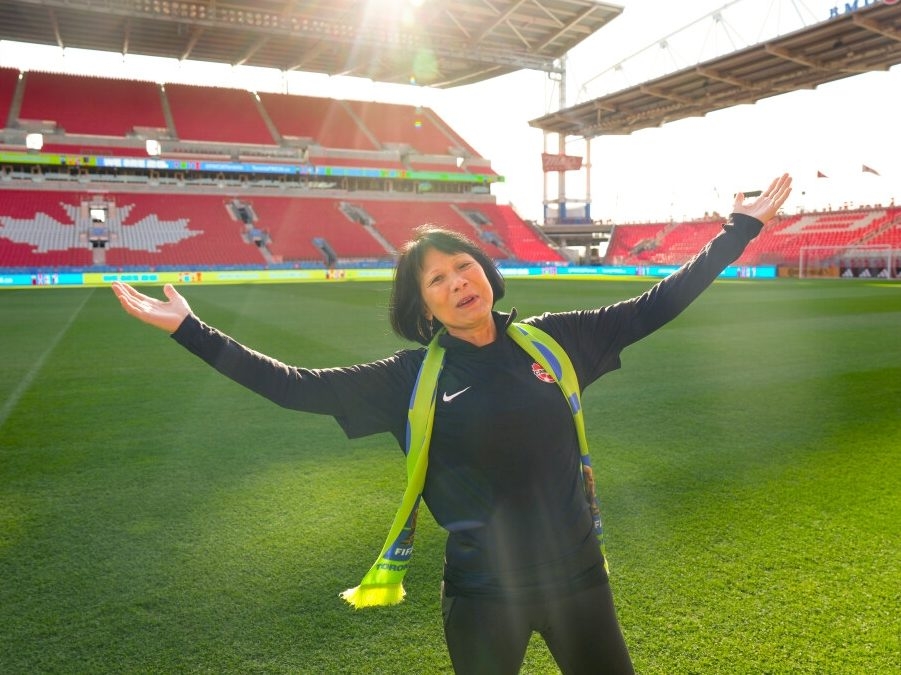City Hall Committees Sound Alarm on Financial Troubles a Year Before World Cup
With less than a year remaining before the start of the event, it seems that the funds from the City of Toronto for the World Cup are still actively being utilized.
Although council members were informed last week that the expenditure plan for the soccer event remains within budget, they also discovered that City Hall is exploring methods to “decrease scale.” Mayor Olivia Chow suggested that the provincial and federal governments might not contribute as expected.
As Chow stated, the soccer scenario is “in flux.”
On Monday, the city’s World Cup subcommittee decided to forward their update regarding government funding directly to next week’s City Council meeting, skipping the influential executive committee in order to provide officials with additional time to develop a comprehensive report. However, Deputy Mayor Ausma Malik ensured that the matter would be included so that the executive committee could address it the following day as well.
We’ve recently gotten some communications from the provincial government that affect our funding for this great opportunity, so we’re currently engaged in some negotiations.
Chow informed the panel on Tuesday.
.
The newly appointed federal cabinet has taken their oaths, but as of now, we are unsure about the actions of the new administration,” the Mayor continued. “We can only hope they uphold prior agreements. Time will tell. Thus, circumstances remain somewhat uncertain.
At that council meeting, officials reported that Toronto’s World Cup initiative remained within its allocated budget. This statement came just one day after Malik questioned Sharon Bollenbach, who leads the city’s World Cup task force, regarding advancements made towards closing the “financial shortfall.”
Bollenbach,
providing an update to the FIFA subcommittee
Regarding the city’s procurement strategy, efforts are underway to identify “potential supporters” for the champions table — individuals who would contribute financially to cover the expenses associated with organizing the soccer competition.
Bollenbach additionally mentioned that city staff members are exploring methods to decrease expenses and possibly scale back the project’s extent.
The concluding version of the procurement update, set for City Council’s vote later this week along with the governmental briefing, suggests councilors empower Bollenbach and the chief of procurement to engage in talks with suppliers whose original quotes surpass established limits.
Toronto will host six World Cup games, with the first set for June 12, 2026.
The report presented by Bollenbach to the committee on Monday indicates that the total capital expenses have increased by almost $10 million since the beginning-of-year projection. Additionally, the reserve funds allocated for operational purposes have decreased from $30.5 million to $21 million. Although the exact reasons behind this cost escalation remain unclear, the document states that the pricing “has exceeded original projections” following preliminary activities at BMO Field.
During the meeting, Malik seemed to imply that worries about tariffs and disruptions in trade might be impacting FIFA’s financial situation.
Bollenbach mentioned that progress is “possibly slightly delayed” at the north end of BMO Field, where additional temporary seats will be installed for the World Cup.
The document states that additional expenses will not only utilize the contingency fund but also come from savings generated by the training facility at Centennial Park and new contributions provided by the operators of BMO Field, Maple Leaf Sports and Entertainment.
The newly allocated $224 million in operational funds continue to constitute the majority of the overall $380 million cost associated with hosting FIFA. This includes expenditures related to general operations, event management, commercial rights costs, as well as designated legacy funding intended for various post-tournament activities and improvements.
social initiatives
For instance, programs like those aimed at providing job opportunities for “historically disadvantaged” youth—appear mostly unaffected.
In April 2022, when the council agreed to support Toronto’s World Cup bid, the estimated expense was set at $290 million.

Deputy Mayor Mike Colle, during his tenure
initial gathering as the subcommittee head
I inquired with Bollenbach regarding the financing strategy for Toronto being a 2026 FIFA host city and was informed that only Toronto and Vancouver’s operations are mainly supported by governmental funds.
“There is a range of governance structures across the 16 cities. … While some receive governmental support, it does not come close to the level provided to the two Canadian cities,” Bollenbach stated.
The discussion didn’t solely revolve around financial issues. Bollenbach also touched upon enhancing community soccer facilities throughout the city and mentioned potential plans for a complimentary fan fest taking place at Fort York and The Bentway.
Although entry might be complimentary, Bollenbach mentioned that the fan fest could require tickets to control crowd numbers.
In the meantime, Bollenbach informed the subcommittee that World Cup merchandise would be available for purchase in the city “very shortly.” He also mentioned that City Hall would receive a portion of the earnings from items specifically tied to Toronto.